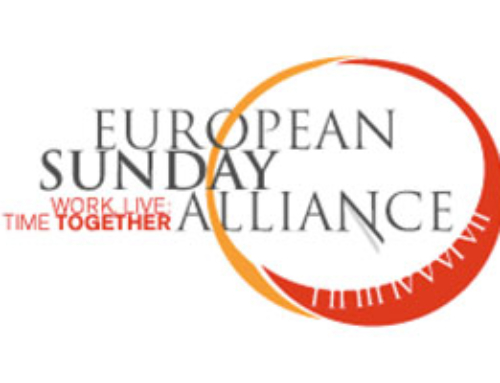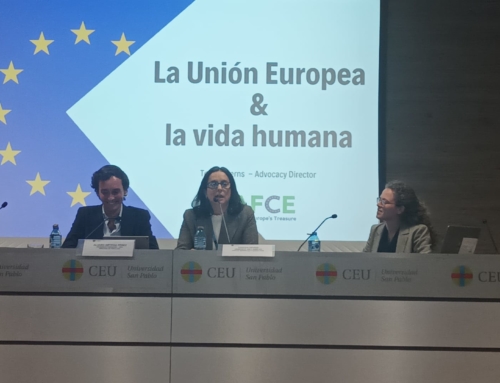FAFCE Board Resolution
Murcia, 4th of May 2023
The crisis of loneliness in times of digital transition: family networks as agents of change
In the current context of digital, environmental and demographic transitions, FAFCE calls the European Union and its Member States to consider family networks as agents of change, with a special attention to the right to disconnect of working parents, to the digital education of children and to their protection from harmful online content.
Recalling the principle of subsidiarity, and the role of parents as first educators of their children, according to the Article 26 (3) of the Universal Declaration of Human Rights, and the Article 5 of the UN Convention on the Rights of the Child;
Recalling its resolution on the family-work life balance of parents, especially its contribution to the EESC Opinion on “Challenges of Teleworking: organization of working time, work life balance and the right to disconnect”;
Recalling the need for an integral education of all persons, as stressed in the Laudato Si’ Encyclical Letter (2015), and in the FAFCE 2021 Autumn Board Resolution on “Families for Sustainable and Integral Development”;
Recalling its European conference on the “Challenges and dangers of children exposure to sexual explicit content in the digital era”, on the 8th of November 2022;
Recalling the FAFCE 2022 Spring Board Resolution on “Families and family associations are builders of peace” that “encourages decision-makers to utilise and support the fieldwork provided by family associations and families in their everyday contribution to peaceful communities”;
Recalling the Apostolic Exhortation Familiaris Consortio (1981) that calls families to “grow in awareness of being “protagonists” of what is known as “family politics” and to assume responsibility for transformation of the society”.
Our Federation
Welcomes the European Commission’s expected new comprehensive approach to mental health in 2023. Notes that it should not ignore the crisis of loneliness that our societies experience.
Notes its links, for better or worse, to the rapid evolution of artificial intelligence, information and communication technologies in the past years.
Stresses that the purpose of digital technologies is to be tools for communication, and never an end in itself: “Digital connectivity is not enough to build bridges. It is not capable of uniting humanity” (Fratelli Tutti, 2020).
Recalls the importance of the family in digital education: distinguishing the real from the virtual, and the object from its image is a learning process that trains critical thinking and leads to the discovery of the complexity of the world.
Affirms the importance of protecting the emotional health and the socialization of children from the negative impacts of virtualization and distant learning. We acknowledge that while technology can offer many benefits, it can also hinder important developmental skills related to human communication and socialization.
Regrets the absence of effective legal instruments to really prevent children from accessing to online pornography; stresses its disastrous consequences at the individual, family and community level[1].
Recalls “that networks of families, in cooperation with schools and local communities, have an essential role to play in preventing and combatting this plague, and in bringing healing to those trapped in the maelstrom of addiction” (Pope Francis, Audience on the XXV Anniversary of FAFCE, 2022).
Calls the European Union and its Member States to
- Recognise the role of family networks and associations as partners, together with the protagonists of informal care and schools, in building a European mental health strategy.
- Recognise a “right to disconnect”, especially when it could positively improve the family/work life balance of parents.
- Establish a work-free Sunday, and promote an “offline” rest time dedicated to social connection and socialisation within families.
- Prioritise the provision of adequate resources and policies to promote a balanced use of technology and to encourage children’s opportunities for in-person socialisation.
- Equip families, parents, and educators to teach their children how to appropriately use digital tools with a care for their mental health and integral development, including providing parents with educational services of training and counselling.
- Ensure the effective implementation of the legal prohibition of children access to online pornography, and launch prevention programs to tackle the growing issue of self-generated sexually explicit material.
- Recognise online pornography as a general public health issue, and actively support awareness programs.
- Use art and creativity as a bridge tool to both celebrate families and to fight loneliness.
Our Federation calls for putting the human person at the centre of digital change, with a special care for the integral development of children, recognizing the primary role of families and family associations.
[1] Resolution of the Parliamentary Assembly of the Council of Europe, “For an assessment of the means and provisions to combat children’s exposure to pornographic content”, 2022.









